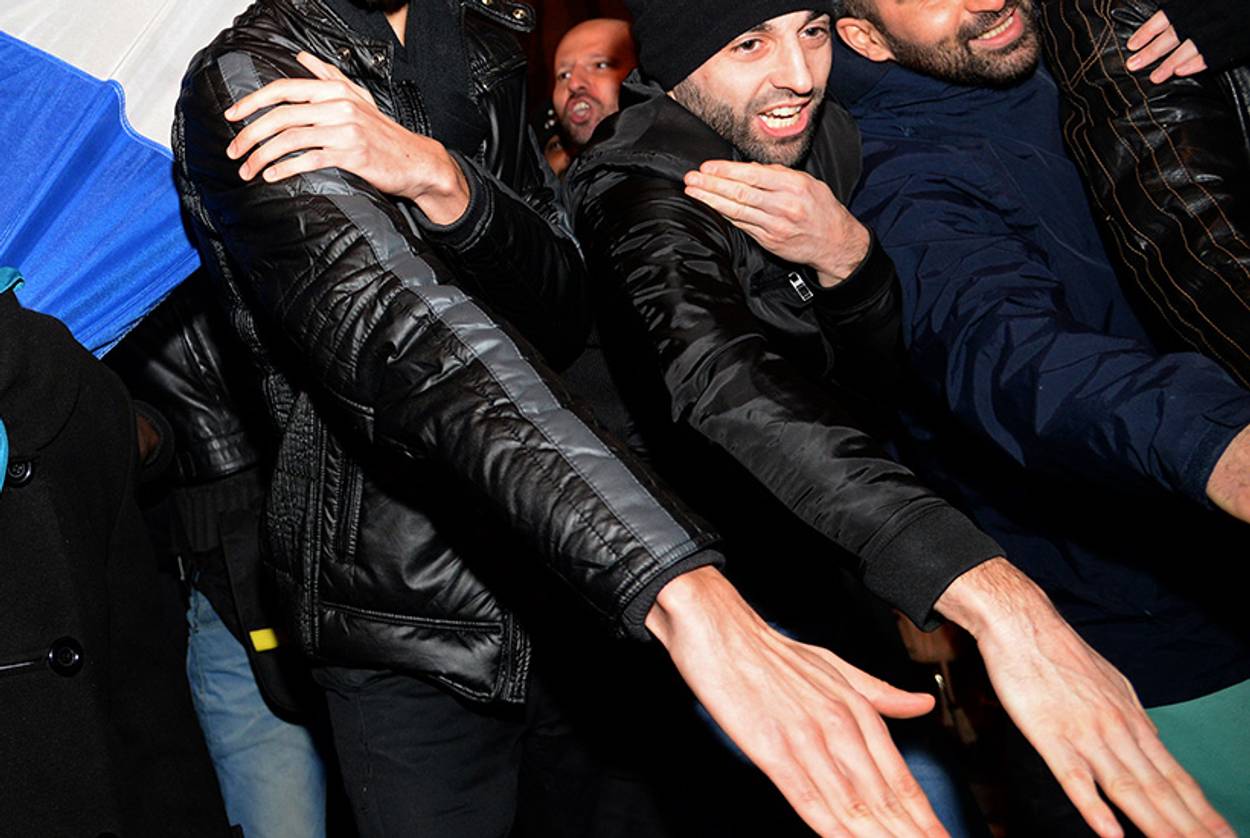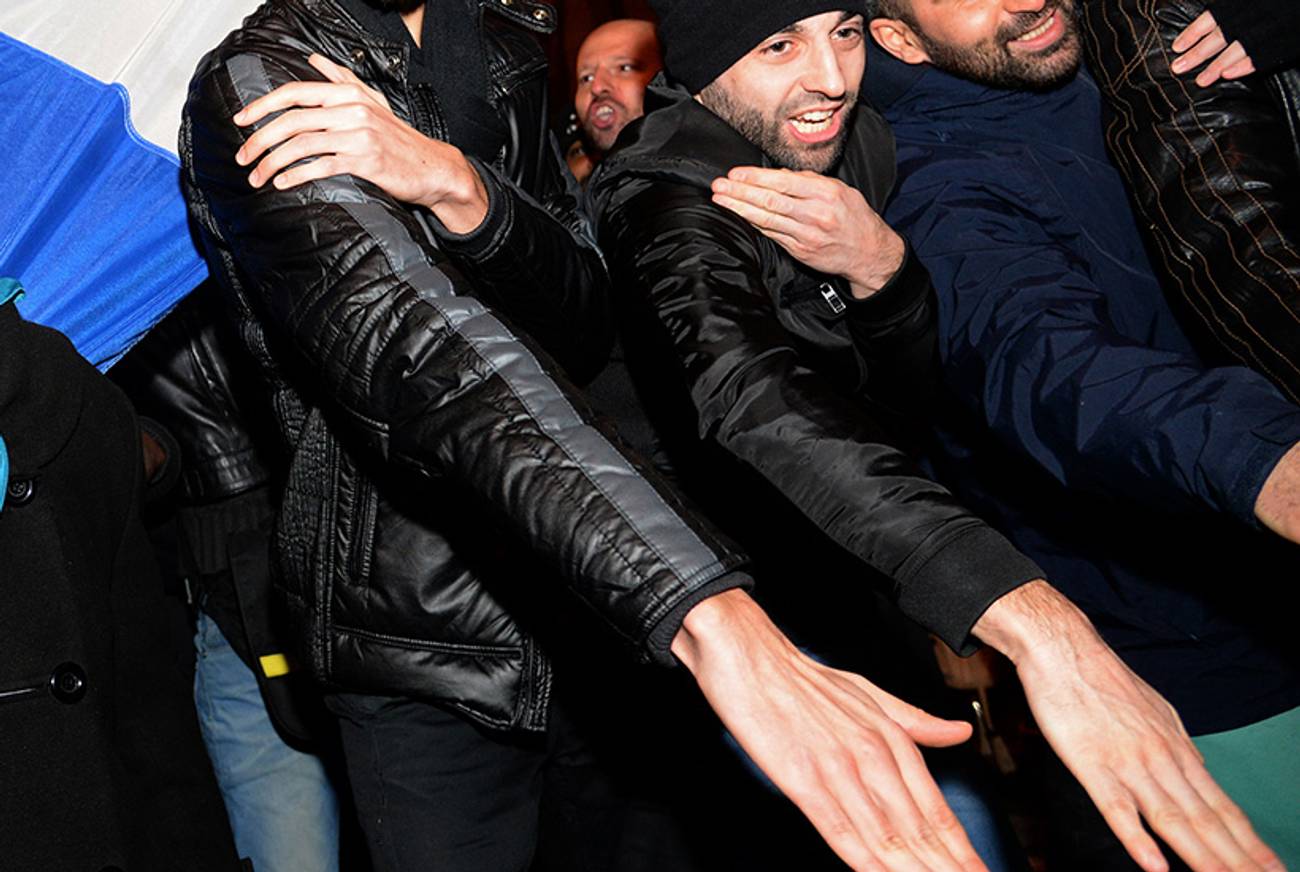Despicable Meme: Why the Quenelle Is the Grumpy Cat of Anti-Semites
Like all viral hits, the reverse Nazi salute is hard to explain and harder to resist, which makes it all the more dangerous




What are we to make of the quenelle?
The gesture, a sort of deconstructed Hitlerian salute, has grown popular on social media platforms, where enthusiasts post photographs of themselves, one arm across the chest and the other stretched downward, often in front of synagogues, banks, and other landmarks that are—in reality or in the bigot’s imagination—somehow connected to Jews. Last week, the French-born footballer Nicolas Anelka struck the pose after scoring a goal for his team, Britain’s West Bromwich Albion. He later tweeted that the gesture was dedicated to his friend, Dieudonné M’bala M’bala, an anti-Semitic, Holocaust-denying comedian. All of which set the Internet’s wheels in motion, calling up pictures of NBA star Tony Parker rocking the quenelle. This week, Parker—who was photographed making the gesture at M’bala M’bala’s concerts, during which the comedian regularly rants about Jewish conspiracies—apologized, asserting he didn’t understand the salute’s symbolic meaning.
The quenelle trend is obviously nasty, but should we really be troubled? After all, in a country like France, that has, in the last few years, experienced a slew of attacks targeting Jews—from the murders of three children and their teacher at a Jewish school in Toulouse to the kidnapping, torture, and execution of Ilan Halimi—fussing over some Internet fad seems about as immaterial as cringing about, say, the quality of the drinking water in Homs: a petty and insignificant concern given the bloody reality outside.
Sadly, though, this is not the case. The quenelle is something just as potent as an armed attack, just as devastating as an act of violence. It is a meme.
The term’s coiner, Richard Dawkins, described a meme as “a unit of cultural transmission, or a unit of imitation.” Just as genes determine biological heredity, Dawkins argued, memes perform the same role culturally, passing down traits from one person to another. Religions, he claimed, succeed so brilliantly in attracting billions of adherents because they function as powerful meme machines, passing down short and meaningful stories in sacred books and Sunday-school lesson plans. The more memorable the story, the more likely it is to survive in transmission, which is why Jesus brings Lazarus back from the dead, Noah builds a massive ark, and Muhammad ascends to heaven atop a winged horse. Memes do not reward subtlety or reason. Memes are magic.
But whereas religion uses memes merely as introductory measures to an infinitely more complex set of theological arguments and dictates, the Internet peddles in them as the perfect unit of meaning: fast, crude, obvious, impossible to resist.
Some dimmer lights, like Anelka and Parker, may not quite grasp this. But M’bala M’bala, for one, understands it very well. He was born in one of the wealthiest suburbs of Paris and raised by his mother, a French sociologist and painter who converted to Buddhism but put her son in Catholic school. He studied computer science in college, formed a comedic duo with his Jewish childhood friend Élie Semoun, and starred in a number of mainstream movies. He enjoyed the kind of polite popularity, the faint praise we offer the well-meaning and perfectly capable entertainers who amuse us before we ask them to move over and allow the hot new star his or her turn in the limelight. M’bala M’bala wanted more than that. He wanted shrieks and howls, a fierce loyalty, a way to measure his success that transcended the mere box-office numbers. To that end, he embraced mimetic thinking.
Observe, for example, the Shoananas song, one of M’bala M’bala’s previous viral hits. The word is a portmanteau of shoa and ananas, French for pineapple. The music is borrowed from a popular children’s song, the lyrics suggest that the Holocaust is a lie perpetrated by wealthy Jews, and a Semitic-looking man sporting a yellow star dances around for good measure. It is, of course, repugnant. It’s also senseless: The song never explains what, precisely, a Holocaust pineapple might be, or what the connection is between mass genocide and tropical fruit. It hardly matters: As a meme, Shoananas is perfect.
To understand why, just look at the most popular memes of 2013. From Ylvis’s fox to Grumpy Cat, these memes, like all other memes, are small and concentrated pellets of human emotion. At their core is some idea—benign or malicious, true or not—that all of us, regardless of education or income or any other variable, can immediately grasp. Whether that idea has to do with cats being foul-tempered or Jews being wealthy ghouls who use the Holocaust as leverage to keep everyone else down hardly matters, especially when the message is coated—as it always is with memes—in a sweet layer of simplicity, an innocent-sounding tune, say, or a cool-looking hand gesture.
The quenelle is an even more perfect manifestation of this logic. In a year that crowned the selfie as its most au courant word, the quenelle works so well not only because it encourages its aficionados to post photos of themselves performing it, but also because it’s a meta-meme, one whose success depends not just on dissemination but also on imitation. Assuming that you aren’t a professional basketball player with a very good career-long field-goal average of .495, if you’d like your take on the quenelle to go viral, you have to set it up against some interesting backdrop, like a poster of Anne Frank or the front of the Toulouse school where those Jewish kids were shot not too long ago. Whereas the Shoananas, say, merely invites you to pass it along, the quenelle demands that you become part of the play. It’s interactive, and that is what makes it all the more dangerous. And it lives on social media platforms, where it can continue to spread without need for context or qualifications.
In the quenelle, then, we may be facing a graver threat than we might first be inclined to perceive. Having switched his allegiance from the far left to the far right, and having repeatedly failed at his attempts to win public office, M’bala M’bala is unlikely to triumph in the old and ossified contest of politics. But in the new battlefield, which shapes culture by inundating it with images and words that defy explanation and are immune to denunciation, he’s already won. The Anti-Defamation League is right to have demanded and received an apology from Parker, but citing history and invoking decency and initiating conversation do little if anything to stop a meme. The garçons who quenelled by a large photograph of Anne Frank aren’t going to be mended by more or better education. They are creatures of the age and children of the Internet, driven by emotion, prone to extremism, allergic to nuance. They’re political idiots, and they gravitate mainly to figures who lay it on thick with fantasies, conspiracies, and hatred. They’re not as likely to elect a new madman as they are to consistently reject the solid institutions on which democracy depends: By not believing in government, by subscribing to the wildest ideas simply because they pose as anti-establishment, by rejecting the dull discourse of laws for the headier stuff of symbolism, these quenellers are eroding the common ground on which we all stand. And that’s a terrible thing.
Even more terrible is the recognition that there isn’t much we can do. M’bala M’bala has been frequently fined for his incitement, and each defeat in court further enhanced his cachet and his coolness with his followers. The one thing we can do is resist the limp logic that argues that the antidote in this situation is more education, more attempts at dialogue, more exertion of resources to try and understand the reasons motivating those who hate us. We ought to do none of that. Hate, like the quenelle itself, is self-explanatory and irredeemable. If we stay vigilant, if we continue to cultivate the values that define us, and if we refuse to trivialize hate because it appears as a goofy post on Twitter or Facebook, we may someday defeat it.
***
Like this article? Sign up for our Daily Digest to get Tablet Magazine’s new content in your inbox each morning.
Liel Leibovitz is a senior writer for Tablet Magazine and a host of the Unorthodox podcast.
Liel Leibovitz is editor-at-large for Tablet Magazine and a host of its weekly culture podcast Unorthodox and daily Talmud podcast Take One. He is the editor of Zionism: The Tablet Guide.